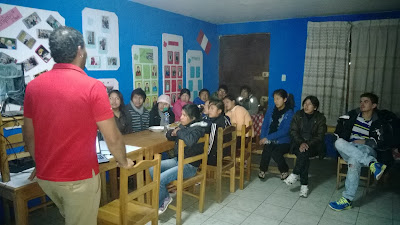Juan AYP: Fostering Responsible, Well-Rounded Leadership
Fostering Responsible, Well-Rounded Leadership
As young leaders, you can now use your new knowledge to become agents of positive change in your communities,” said Josue Alcántara Marte while conducting a workshop for Mosqoy students to create awareness and tolerance for learning disabilities and other mental health conditions. Josue is a psychologist working as a participant of our intercultural exchange, Máximo Nivel, who agreed to share his knowledge and experience in special needs education with our students last week. In addition to learning about the characteristics, causes, and treatments for different mental health conditions, the students received an empowering message about their role in changing the way that their communities treat people with mental health conditions. When closing the workshop, Josue asked the students how their communities treated these people, and more importantly, how the students themselves treated people with disabilities. He concluded by asking about what they could do to ensure that people with disabilities receive the treatment and support that they need and deserve. The students then took the initiative in starting a brainstorming conversation about how they could, as individual leaders, bring this knowledge to their communities to improve behaviors towards people with special needs. |
| Mental Health Workshop |
Ultimately, Mosqoy aims to promote and participate in community driven development through the individual development of young leaders. Therefore, we strive to create responsible and well-rounded leaders who will take the initiative to lead by example towards positive and responsible empowerment in their different social circles. Throughout this process, we have seen our students gain and spread awareness and tolerance in a variety of social aspects. For instance, the influx of money and new industries due to the tourism boom has created an elitist attitude in many Sacred Valley towns that discriminates against peasants and farmers, to the point where young people will use the word campesino, or peasant, as an insult. On the contrary, our students maintain pride in their roots and travel back home every weekend to help their families by working their fields or selling traditional weaving products. Their pride in Quechua culture and traditional life styles makes them exceptional and responsible citizens who promote acceptance and support for campesinos. With the Mosqoy workshops, these young people are gaining the knowledge and skills to become truly great, inclusive leaders in their communities.



Comments
Post a Comment